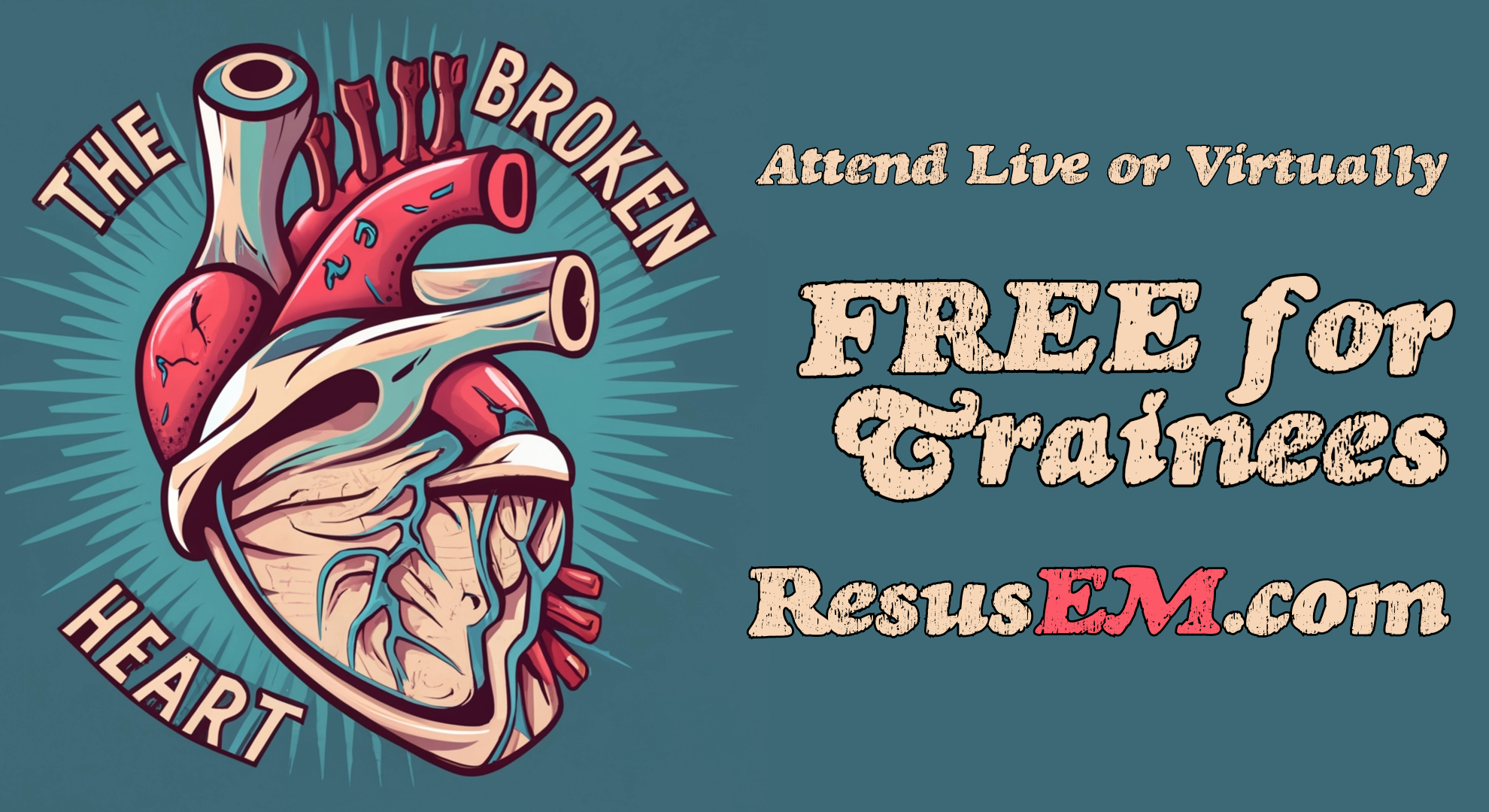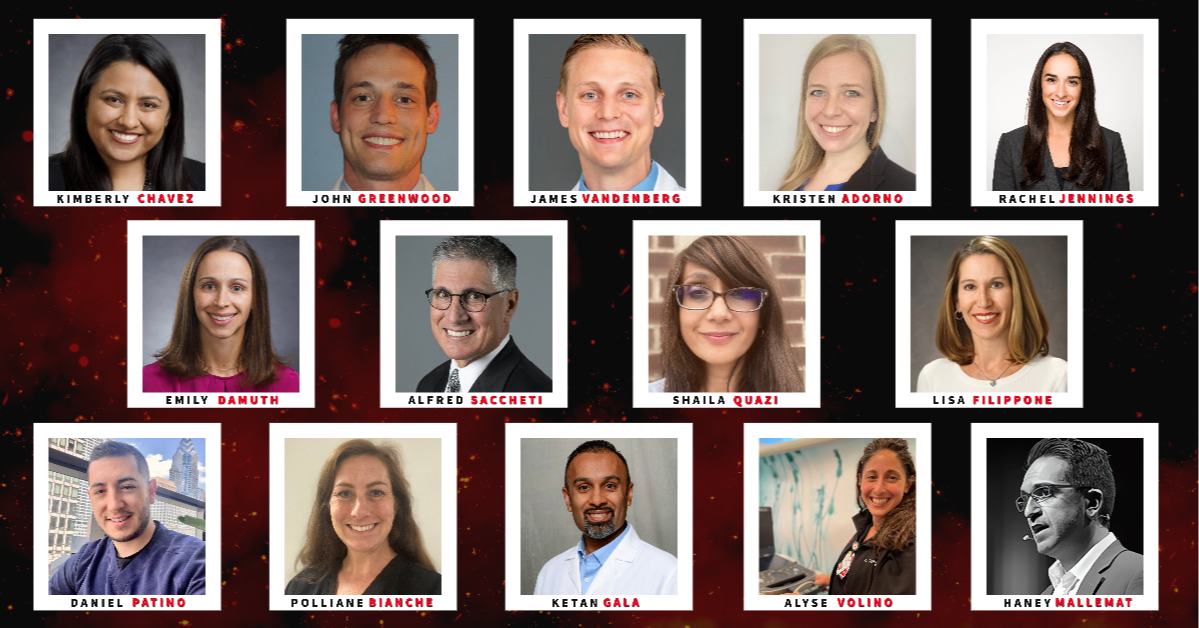
The Educational Newsletter From CriticalCareNow!
Welcome to this week's newsletter. We've got a ton of stuff to cover with you, so let's get right to it.
- Last chance to register for FREE conference for trainees and ResusX attendees
- Lido or Amio for ut of hospital cardiac arrest?
- Speaking of cardiac arrest, we have a debate on mechanical vs. manual CPR
- The many uses of vasopressin
- Vascular Access like a PRO!
- Chris Reilly is talking ultrasound during a code to look for a PE!
This week's newsletter is pretty amazing, so let's get going with Last Week Now!



Are You Coming to ResusEM?
ResusEM is happening on October 4th, 2023 and is a full day conference hosted by Cooper Hospital. This is the sixth year Cooper is hosting this regional conference and this year we have an incredible lineup. As always, ResusEM is FREE for trainees, that's right FREE. Whether you want to attend in-person or virtually all trainees have a FREE ticket. And if you're an attending, interested in CME, this will be a CME event. Attending registration goes directly towards keeping this conference free for students, residents, and fellows. So consider registering for the conference to keep this FREE.
But I have one more surprise for you...if you registered for ResusX:Live in Philly, we are throwing in this conference for FREE. That's right, if you are registered to attend ResusX in-person, then you'll get a free ticket to this event on October 4th. But what if you're registered for the UltraRounds conference on October 4th as well? Don't worry, we'll give you access to the videos after the conference. I want you to get as much education on resuscitation as possible.
Seats are limited so click on the link below to get registered right now.

Lidocaine or Amiodarone for OHCA?
The debate has been out there for some time and there's a study that might help clear things up. Don't sweat it, I reviewed the article and you can check out my video review here. Please leave a comment as to which you like to use.
Check out the video here.


The Great CPR Debate
In this debate from ResusX: ReVolved, Salim Rezaie, and Anand Swaminathan tackle the contentious topic of Mechanical versus Manual CPR. Swaminathan, also known as "The Swami," begins by arguing against Mechanical CPR, asserting that there is no compelling high-quality evidence to support its superiority over Manual CPR. He emphasizes the critical importance of high-quality CPR and early defibrillation in achieving good neurologic outcomes in cardiac arrest cases. Swaminathan raises concerns about the obstacles, costs, and training required for Mechanical CPR devices, suggesting that they may not be justified in many settings. He concedes, however, that there might be a role for these devices in scenarios with limited rescuers or prolonged transport times. Rezaie, "The Rebel," counters by acknowledging their shared belief in the significance of compressions and defibrillation but argues that humans often struggle to maintain the quality of compressions. He highlights the potential cognitive offload that Mechanical CPR offers and cites a meta-analysis that found no significant difference in outcomes between Mechanical and Manual CPR. Rezaie also mentions scenarios where Mechanical CPR could be particularly beneficial, such as in ECMO/eCPR cases and scenarios with limited personnel. The debate leaves the audience with plenty to ponder regarding the use of Mechanical CPR devices in cardiac arrest management.
Check out their amazing video now! If you want to check out the entire conference, click here.

💉Anti-Diuretic Hormone (or Vasopressin) uses
— Mark Ramzy, DO, EMT-P (@MRamzyDO) September 2, 2023
🫀Not recommended in Cardiac Arrest
🦠Use in Septic shock after Norepinephrine can reduce additional pressor requirements
🧠Useful in Central Diabetes Insipidus#FOAMed #FOAMcc #MedTwitter
Follow for more #MedEd & #infographics pic.twitter.com/q4AEK64mqI



Vascular Access Masterclass
In this episode namely "Vascular Access Masterclass", a renowned vascular RN and educator also known as "The Vascular Guy" on social media platforms like TikTok and Instagram, delved into various aspects of vascular access, providing valuable insights and tips for healthcare professionals. The discussion covers topics such as selecting the right catheter for different clinical situations, the importance of catheter size and flow rate, strategies for preventing central line-associated bloodstream infections (CLABSIs), ultrasound techniques for successful needle localization, and handling accidental arterial punctures. Additionally, the episode emphasizes the importance of assessing for pneumothorax using ultrasound and highlights the benefits of open discourse and learning in the dynamic field of vascular access.
Key Takeaways:
- Choose the Right Catheter: Selecting the appropriate catheter depends on the clinical situation, with different considerations for hemorrhagic emergencies and non-hemorrhagic situations.
- Catheter Size and Flow Rate: Catheter length and diameter significantly affect flow rates, making it crucial to match the catheter to the patient's needs.
- Preventing CLABSIs: Proper sterile insertion techniques, low IJ placements, and sutureless devices can help reduce central line-associated bloodstream infections.
- Effective Ultrasound Use: Stabilize the ultrasound probe for better accuracy, employ the fanning technique, and consider the Pythagorean theorem for angle and catheter length.
- Managing Arterial Punctures: In cases of inadvertent arterial punctures, maintain pressure when using an introducer needle and avoid removal; consult surgery for further evaluation and management.
This podcast is for members only so if you want to listen to the full episode, sign up for membership down below.


Chris Reilly is a guitar-swinging, song-singing, education-bringing physician from NYC. Follow at @docreilles on Instagram and TikTok. Let's see what Chris has for us this week.
CASA Protocol: Does Right Heart Strain = PE?
Point of Care Ultrasound or POCUS is something we as resuscitationists are all very familiar with but how do you utilize it during cardiac arrest? The CASA protocol (Cardiac Arrest Sonographic Assessment) was developed for this exact case. CASA is a three-step timed protocol that involves assessing for reversible causes of cardiac arrest including pericardial tamponade, right heart strain due to PE, or MI with ventricular wall motion abnormalities. When thinking of PE, we all think of signs of acute right heart strain right? Well, there have been some animal studies suggesting that signs of right heart strain may be inherent to cardiac arrest in general. Human studies have shown that RV dilation may not always indicate a PE, and it is suggested that other clinical factors and physical exam findings (i.e. signs of DVT) should be considered alongside ultrasound findings when deciding whether to administer thrombolytics during cardiac arrest.
CHRIS’ CAUTIONS: I am a believer in the CASA protocol, but make sure you keep track of your time (<10 seconds) during each view as interruptions in compressions can lead to decreased rates of ROSC and worsened hypoxic injuries. Also, keep in mind that there are mimics to PE findings of acute right heart strain on POCUS. I’ve had a patient with massive bilateral pneumonia with signs on POCUS consistent with PE (i.e. McConnell, D sign, etc.) present! Lastly, remember that most of these reversible causes of cardiac arrest will be found if the rhythm is PEA as opposed to a shockable rhythm or asystole. So, when you see PEA, grab that gel!
Check out the full article by Jeff Pepin.



Join the ResusNation and Get Tons of Content For Less Than a Cup of Coffee
Signup for the ResusNation today and see why over 500 resuscitationists are members. As a ResusNation member you will receive extra content from CriticalCareNow such as live digital teaching sessions, podcasts, free video lectures, a library of grand rounds, and so much more. Check out the memberships options available below and pick the one that is right for you.
There's nothing to think about, you'll be automatically billed monthly and cancel anytime....no questions asked! Looking for a deal? Pay for a yearly pass and get one month free!

ResusNation: Basic Membership (Monthly)
Show your support with our basic membership.
-
Access to 2 cutting edge lectures monthly from world-renowned speakers every month
-
Unlimited viewing of videos
-
Ability to watch on a desktop or mobile video player
-
Pay for a monthly or yearly membership
-
CEUs available

ResusNation: All-Access Pass (Monthly)
The ULTIMATE membership! In addition to everything in the basic plan, you'll also receive:
-
5 cutting-edge lectures monthly from world-renowned speakers
-
Exclusive weekly podcasts
-
Attend the exclusive Q & A session with Grand Round speakers
-
Access our Grand Rounds library and watch previous episodes on replay.
-
Watch every Chawk Tawk on replay
-
Join our twice-monthly hangouts where you can hang out and ask us anything
-
Access the ResusX Community, a forum for questions, post cases, & interact and network with others
-
Receive CEU credits for the content that you watch
-
Pay for a monthly or yearly membership

ResusNation: Basic Membership (Yearly)
Show your support with our basic membership.
-
Pay for the year and get one month FREE!
-
Access to 2 cutting edge lectures monthly from world-renowned speakers every month
-
Unlimited viewing of videos
-
Ability to watch on a desktop or mobile video player
-
Pay for a monthly or yearly membership
-
CEUs available

ResusNation: All-Access Pass (Monthly)
The ULTIMATE membership! In addition to everything in the basic plan, you'll also receive:
-
Pay for the year and get one month FREE!
-
5 cutting-edge lectures monthly from world-renowned speakers
-
Exclusive weekly podcasts
-
Attend the exclusive Q & A session with Grand Round speakers
-
Access our Grand Rounds library and watch previous episodes on replay.
-
Watch every Chawk Tawk on replay
-
Join our twice-monthly hangouts where you can hang out and ask us anything
-
Access the ResusX Community, a forum for questions, post cases, & interact and network with others
-
Receive CEU credits for the content that you watch
-
Pay for a monthly or yearly membership



